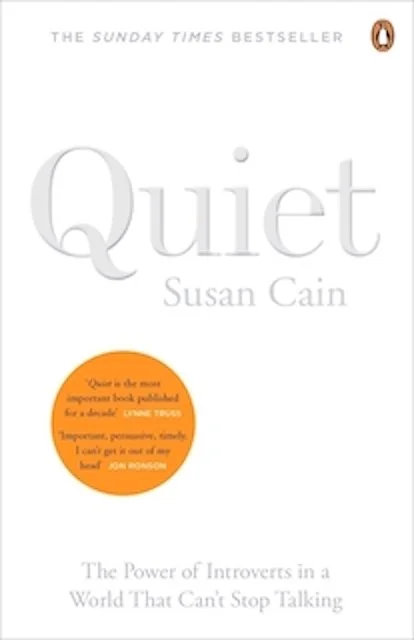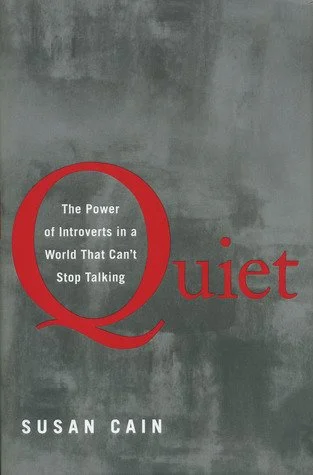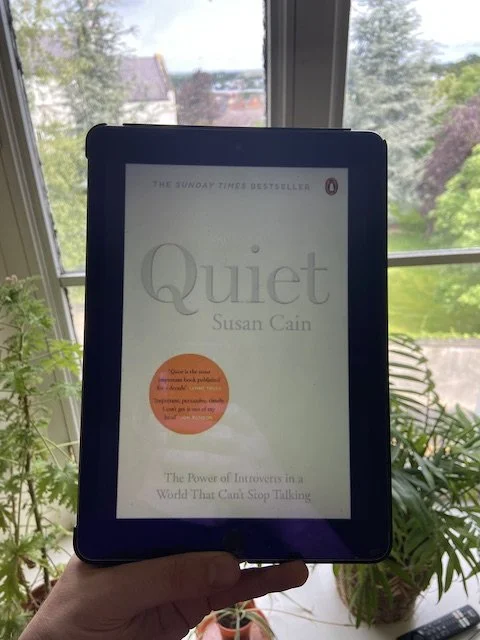Book Review - Quiet: The Power of Introverts by Susan Cain
Shyness is nice, and shyness can stop you, from doing all the things in life you want to.’
So sang Rick Astley of the Blossoms. Sorry, I did of course mean Morrissey of The Smiths. I thought of these lines whilst reading ‘Quiet: The Power of Introverts’ by Susan Cain, an insightful and thoughful book that has been on my TBR list for a while.
Books for introverts
As a bookish, introverted child, I would have loved to have found this on a ‘books for introverts’ shelf in the library. Reading it, I can look back and see so much of my behaviour and personality explained. It’s not that I didn’t know I was shy, but I suppose a book like this would have helped me see there wasn’t anything wrong with me. I didn’t see being quiet as a positive thing -someone in the book describes it as being somewhere between a ‘disappointment and a pathology’ and that about sums it up.
I’ve heard myself being described by others as ‘quiet’ and I think like many others there has been a certain stigma to it. And I’ve always hated phrases like ‘bring him out of his shell’. But the great thing about ‘Power of introverts’ by Susan Cain is that it helps you to embrace the term, to see that introverts, who are between one third and a half of the population, can be just as successful and powerful as extroverts, because of their traits and not in spite of them.
Introvert-Extrovert Spectrum
At an early point in this book, one scientist states that the most important aspect of our personality -’the north and south of temperament’ as it’s described, is where we find ourselves on the introvert-expert spectrum. And after reading this back you can see just how much it influences our education, choice of career, our circle of friends, how we socialise, the risks that we take in life, even the neural pathways in our brains.
Of course pharmaceutical companies have got in on the act, labelling extreme shyness as ‘social anxiety disorder’. This again reinforces the idea that this trait (though I accept there are extreme cases of shyness) can be solved by popping a pill. Perhaps the problem is with how we educate children in large groups, and work in open plan offices? Society is built for extroverts.
It’s a recurring theme, persuasively argued by Susan Cain throughout, that introverts are incredibly undervalued. Visiting Harvard Business school, a Tony Robbins seminar and an evangelical church, we see how extroverted leadership dominates many aspects of society.
The book emphasises that individuals are complex, and that we can’t just be labelled one or the other. There is plenty of crossover in our traits, and as Carl jung said:
There is no such thing as a pure introvert or a pure extrovert. Such a man would be in the lunatic asylum.’
There are so many fascinating snippets in this book. From the evolutionary reasons for stage fright (‘when we were on the savannah, imagine the dangers of feeling that something was looking at you’’) to blushing (shows humility, modesty and lack of aggression) and the literal definition of thin skinned (low reactive extroverts sweat less, so their skin is thicker and cooler) And particularly interesting was the chapter on how extroverts and their risk taking caused the financial crash.
Shyness and Introversion
Interestingly,’Quiet; the power of introverts’ also highlights a common mistake that people assume when they think of introverts - they are not misanthropic, rather preferring smaller groups. Another important point is that not all introverts are shy (this is a fear of social disapproval) - introversion is a preference for environments that are not overly stimulating. Shyness and introversion are not the same things.
Susan Cain goes into detail about one of the biggest fears that introverts face - public speaking. As a speaker at conferences this is something that she’s had to manage, and I found this section to be really useful. It’s a reminder that introverts have to work on developing particular skills that come easy to other people, such as extroverts.
Introverted Children
I would also say that if you are a parent of an introverted child, there is a particularly useful chapter on how you can help them. Not to change them or label them, but to help them engage with learning on their terms, and not to feel emotionally threatened. After reading this book you can only hope that teaching for introverted kids is reflected in classrooms, but there’s a long way to go before that happens, it seems. But supportive parents can be a major help to their kids.
Being Bookish
Personally, I can look back and see why I made certain choices in my life - I can see that they were certainly influenced by my being an introvert. There were times when I wish I had worked harder on certain skills, such as public speaking, because it would have helped me. But at the same time, I can’t change my personality, and nor would I want to.
In my early teens I didn’t write ‘frightening verse to a buck toothed girl in luxemburg’, but a lovely girl called Andrea in Germany who kindly sent me a bit of the Berlin wall when it crumbled. I spent warm summer days indoors, usually reading and writing. I had friends and wasn’t a hermit but I was most comfortable by myself. Social events drained me, and like a phone battery I could only recharge by being myself. That’s still the case.
Noha over at Nohawrites has also written about this in a post on introverts, about how the extroverted world leaves us exhausted. Indeed, reading is the activity that introverts are drawn to, allowing us to recharge, ‘to catch our breath, and go again.’
Nowadays, I don’t feel guilt when I make a decision not to attend a social gathering and decide to stay in and read a book instead. I still feel pangs of self consciousness when I’m in a big group of people and others are louder and more expressive than I am, but I don’t shrink into myself and anyway, I love more intimate, deeper conversations with individuals and smaller groups.
And Proust said it best about books,
‘That fruitful miracle of communication in the midst of solitude’.
I do spend too much time in my own head, but that’s part of my personality too. And being that way has resulted in my lifetime interest in meditation and mindfulness. You can probably tell I love books, both reading them, writing, and talking about them. So my personality has resulted in such a rewarding hobby. Being bookish and introverted has resulted in this blog, and we can all agree that’s a good thing! I think I feel a ‘books for introverts’ blog post coming on.
‘Our culture made a virtue of living only as extroverts. We discouraged the inner journey, the quest for a center. So we have lost our center and have to find it again.’ Anais Nin
Quiet Susan Cain Summary
I found great solace and validation in this engaging and fascinating book. It’s well researched with lots of relevant scientific studies, case studies about introverts, and interviews with a range of interesting people.
As Susan Cain says, ‘if there is only one thing you take away from this book, I hope it’s a newfound sense of entitlement to be yourself.’ I certainly got that, and if I can paraphrase another Smiths song ‘introverts of the world, unite (quietly) and take over’.
First published january 24, 2012 by Crown Publishing Group/Random House,
325 pages kindle
Goodreads score 4.07
Read as part of the 2023 non-fiction challenge and TBR pile challenge
if you liked this book you will also like lost connecions by johann hari




